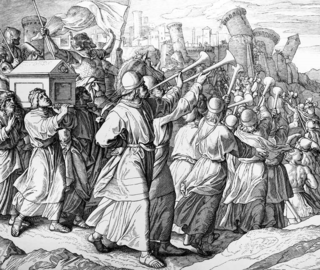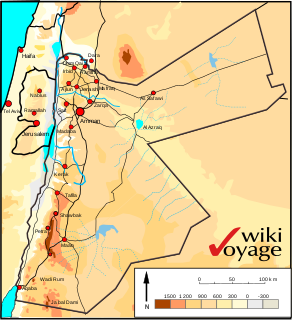 W
WThe Book of Joshua is the sixth book in the Hebrew Bible and the Christian Old Testament, and is the first book of the Deuteronomistic history, the story of Israel from the conquest of Canaan to the Babylonian exile. It tells of the campaigns of the Israelites in central, southern and northern Canaan, the destruction of their enemies, and the division of the land among the Twelve Tribes, framed by two set-piece speeches, the first by God commanding the conquest of the land, and, at the end, the second by Joshua warning of the need for faithful observance of the Law (torah) revealed to Moses.
 W
WAchan, the son of Carmi, the son of Zabdi, the son of Zerah, of the tribe of Judah, is a figure who appears in the Book of Joshua in the Hebrew Bible in connection with the fall of Jericho and conquest of Ai.
 W
WAchsah, was Caleb ben Yefune's only daughter. The meaning of her name is uncertain.
 W
WAi was a Canaanite city. According to the Book of Joshua in the Hebrew Bible, it was conquered by the Israelites on their second attempt. The ruins of the city are popularly thought to be in the modern-day archeological site Et-Tell.
 W
WThe Battle of Jericho is an incident from the Book of Joshua, being the first battle fought by the Israelites in the course of the conquest of Canaan. According to Joshua 6:1–27, the walls of Jericho fell after the Israelites marched every day once for six days around the city and seven times on the seventh day then blew their trumpets. Excavations at Tell es-Sultan, the biblical Jericho, have failed to substantiate this story, which has its origins in the nationalist propaganda of much later kings of Judah and their claims to the territory of the Kingdom of Israel. The lack of archaeological evidence and the composition history and theological purposes of the Book of Joshua have led archaeologists like William G. Dever to characterise the story of the fall of Jericho as "invented out of whole cloth."
 W
WJoshua or Jehoshua is the central figure in the Hebrew Bible's Book of Joshua. According to the books of Exodus, Numbers and Joshua, he was Moses' assistant and became the leader of the Israelite tribes after the death of Moses. His name was Hoshea the son of Nun, of the tribe of Ephraim, but Moses called him Joshua, the name by which he is commonly known. According to the Bible he was born in Egypt prior to the Exodus.
 W
WThe Joshua Roll is a Byzantine illuminated manuscript of highly unusual format, probably of the 10th century Macedonian Renaissance, believed to have been created by artists of the imperial workshops in Constantinople, and is now held in the Vatican Library.
 W
WMount Seir is the ancient and biblical name for a mountainous region stretching between the Dead Sea and the Gulf of Aqaba in the northwestern region of Edom and southeast of the Kingdom of Judah. It may also have marked the older historical limit of Ancient Egypt in Canaan. A place called "Seir, in the land of Shasu", thought to be near Petra, Jordan, is listed in the temple of Amenhotep III at Soleb.
 W
WRahab was, according to the Book of Joshua, a woman who lived in Jericho in the Promised Land and assisted the Israelites in capturing the city by hiding two men who had been sent to reconnoiter the city prior to their attack. In the New Testament, she is lauded both as an example of a saint who lived by faith, and as someone "considered righteous" for her works.
 W
WTransjordan is an area of land in the Southern Levant lying east of the Jordan River valley.